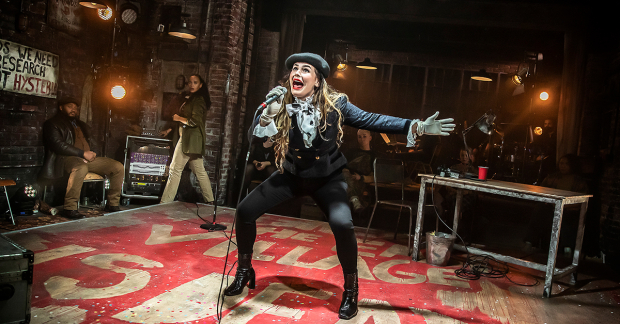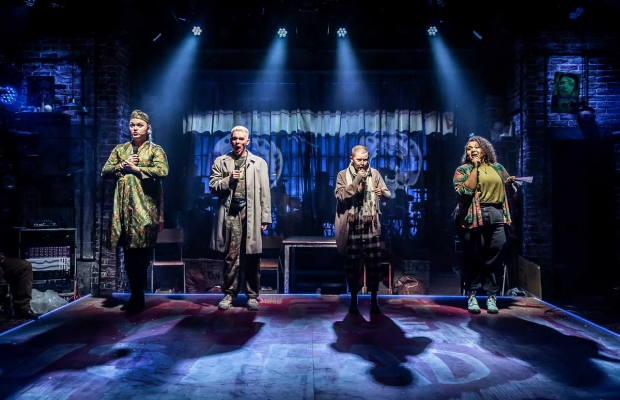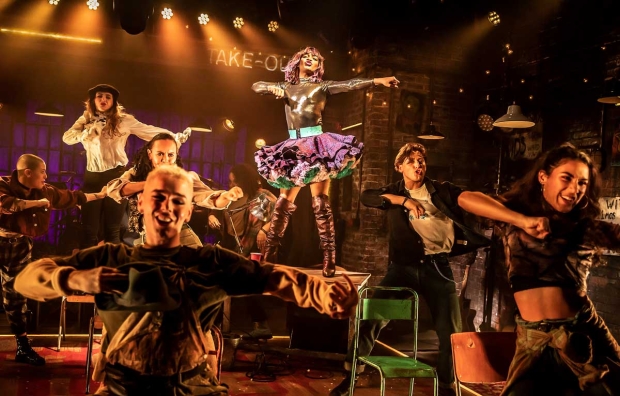
© Pamela Raith
Introducing the opening night performance hours before theatres are forced shut again, joint artistic director Joseph Houston tells the audience how they fought as hard as they could to produce "this special show." This fighting spirit defines and surges through Luke Sheppard's sensational revival of Jonathan Larson's Pulitzer Prize-winning musical about the transformative power of hope and love.
The show begins with the sounds of the hustle and bustle of 1989 Manhattan; a place with a relentless forward motion which can leave people left behind. This is the experience of our characters: a group of struggling young artists whose talents are overshadowed by poverty and the rampant fatality of HIV and AIDS. As their plight tightens, they find the fortitude to protect each other from death and leave an artistic legacy in an ever-hostile world, all while scraping together rent.
The rustic design renders the shabby character of the city and their apartment. On the walls of David Woodhead's set, tatty posters of graffitied Reagan, Keith Haring artwork and gay rights placards are plastered over exposed brick. The central stage is bordered by an LED bar which crackles whenever characters touch, ominously signalling the fearful danger of physical contact and transmitting the disease.
Despite the bleakness of this context, the show pulsates with life, colour and passion. Howard Hudson's lighting uses the American red, white and blue to suggest a national crisis and the interweaving of their political activism with their own vibrant personalities. Reinforcing the sense of widely felt shared experience, the cast always sits watching on the stage's periphery, invested in each other's stories as feelings and fates are interconnected, rippling across faces.

© Pamela Raith
Indeed, the most transcendent moments are when the presence of the communal group and the sheer galvanising force combine to make the piece feel like an act of communion and collective healing. When Tom Francis' Roger is crushed by his fear of dying an undignified death, the cast's elegiac singing feels curative. At another moment, the surrounding cast holds up a mic cable to form a boxing ring around a fiery tango between Blake Patrick Anderson's Mark and Jocasta Almgill's Joanne, throbbing with their pugilistic determination and resilience to go on fighting.
It's the performances which really ignite the production. Larson's music is often infectious and anthemic, but it's especially emotionally charged at the moment, not least with the resonant disillusionment with the American government callously condemning thousands to death. The angry rock ballads inject defiance, such as Maiya Quansah-Breed's electrifying performance as Mimi in "Out Tonight" – a whirlwind of punkish self-assurance, her raspy voice almost scarred by fury, desperation and loss. Her playfulness with Francis' Roger creates a charming chemistry as they flirt over a candle in "Light My Candle".
Francis – in an incredible professional debut – carries his tall, swaggering figure often roaring across the stage with his desire for self-preservation, terrified both of dying before completing his song and of losing another girlfriend in Mimi. Anderson's Mark is also charismatic and earnest, his meekness suggesting the camcorder he uses to film the city-dwellers is actually a shield from confronting an unbearable reality. Ahmed Hamad is a strong counterpoint as Benny, their prim, philistine landlord, avariciously demanding money from his ex-friends, darting his fingers and eyes at them with scorn and echoing the widespread contempt for their culture.

© Pamela Raith
The storytelling and consistently magnetic performances pound with this dazzling energy, while also understanding when to pull back with the sensitivity to explore the harshest suffering. Occasionally the breathless pacing and unrelenting intensity can feel a little numbing, but it feels a necessary propulsion forward into optimism and out of despair.
The show ends with the affirmation there's "no day but today", and this production will live in the memory today, tomorrow and its emphatic compassion will carry through until theatres reopen again.












